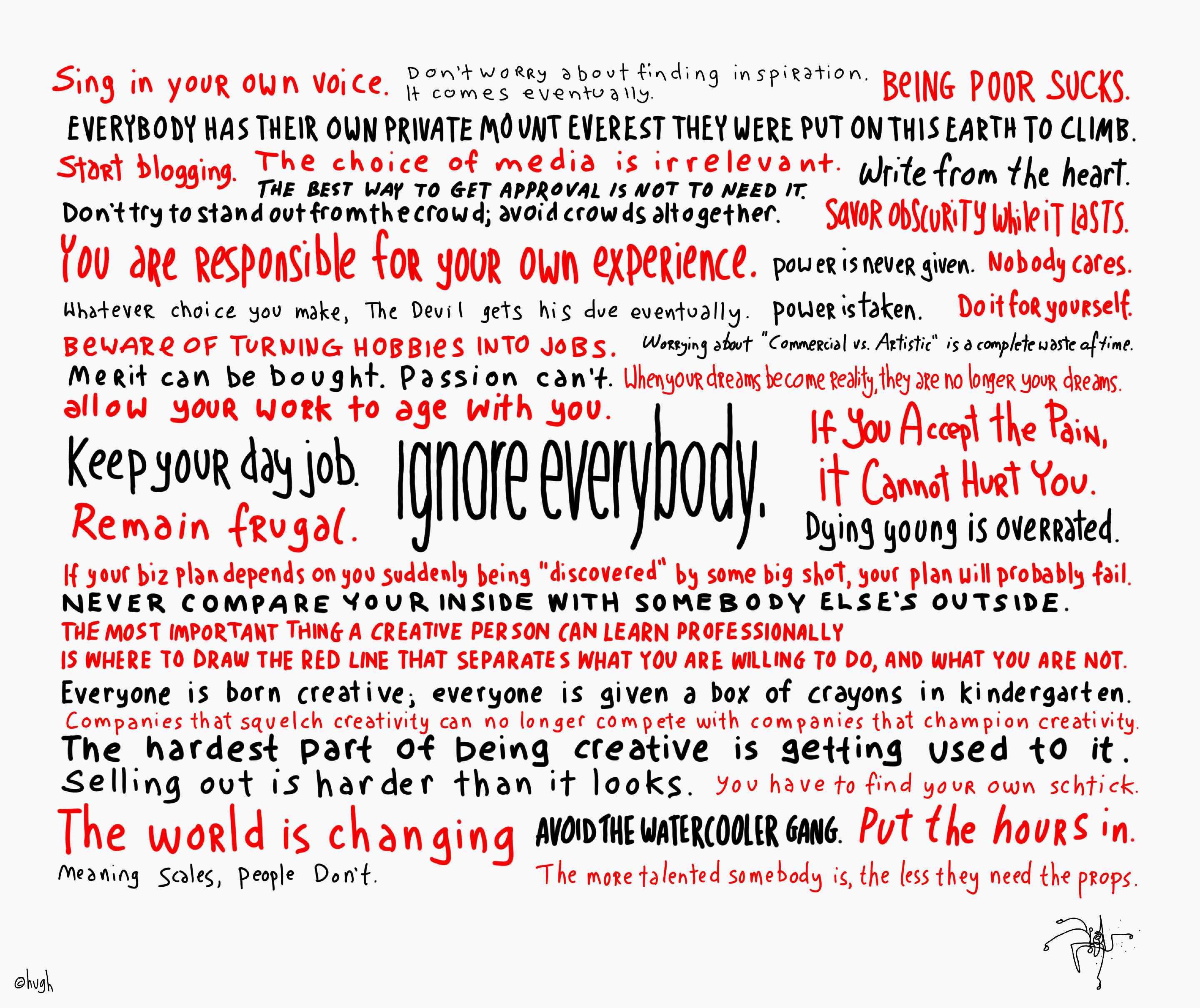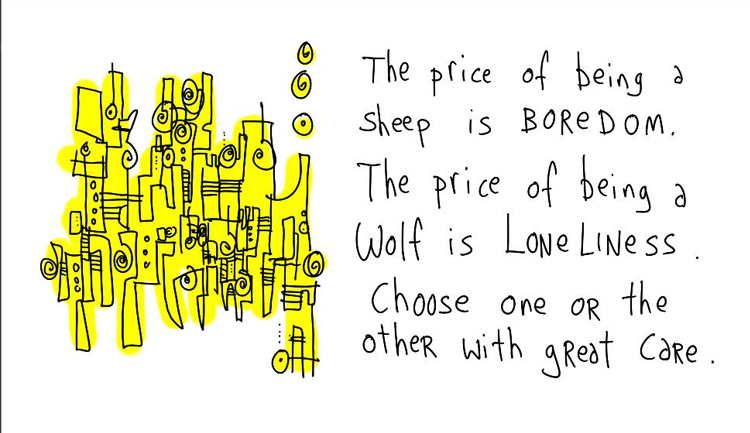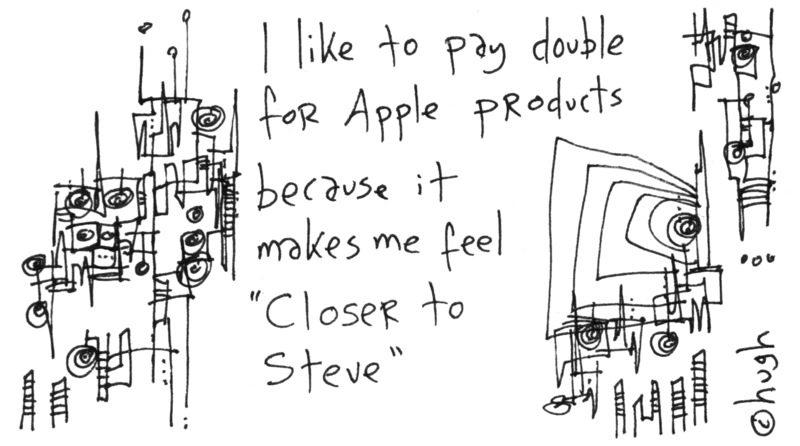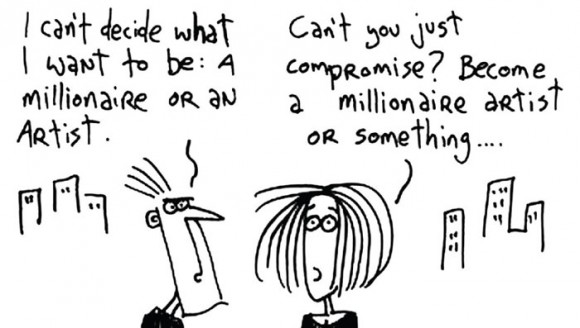Have you felt your creativity drying up? You know, that awful feeling of hitting the wall and getting a writer’s or artist’s block?
Well, dive into the wacky illustrated world of Hugh MacLeod, author of Ignore Everybody – And 39 Other Keys to Creativity. Creator of the hugely popular Gaping Void cartoons and a copywriter in Madison Square Avenue, MacLeod dishes out lots of mantras in the slim volume.
Opinionated and hard hitting, Ignore Everybody isn’t a typical management book. You won’t learn the ABCs of putting together an artistic portfolio or shooting a Hollywood blockbuster. Nor will you be given a checklist of things to do and not to do.
Ignore Everybody isn’t for everybody. Written with much soul, it’s collection of 40 riffs on creativity serves more as a “wake-up” call rather than an instruction manual.
What you will get is a collection of advice for anybody keen to re-ignite their creative mojo.
Let me highlight some of the more interesting insights from the book.
#1 Ignore Everybody
The central premise of the book, MacLeod’s theory is that good ideas alter the power balance in relationships and hence are often resisted. The more original your idea is, the less good advice you can get from others.
MacLeod’s own experience with the doodling of cartoons on the back of business cards provides a good back story to this tenet. What started as a hobby later became the central pillar of his success as a business cartoonist.
This principle of doing it your own way is further developed in other related riffs:
- The idea doesn’t have to be big. It just has to be yours.
- If your biz plan depends on you suddenly being “discovered” by some big shot, your plan will probably fail.
- You are responsible for your own experience.
- Don’t try to stand out from the crowd; avoid crowds altogether.
- Nobody cares. Do it for yourself.
- The best way to get approval is not to need it.
#2 Pain and Gain in Creativity
Are you busting your guts in pursuit of your art and creative pursuits? If not, you ought to do so – at least according to MacLeod.
This notion isn’t unique to the book – practically every volume on success has their equivalent “10,000 hours” popularized by Malcolm Gladwell.
Quoting MacLeod:
“Doing anything worthwhile takes forever. Ninety percent of what separates successful people and failed people is time, effort and stamina.”
This concept of personal endurance and perseverance is further elaborated in various creativity oriented mantras:
- Put the hours in.
- If you accept the pain, it cannot hurt you.
- Everybody has their own private Mount Everest they were put on this Earth to climb.
- Merit can be bought. Passion can’t.
- Remain frugal.
- Avoid the Watercooler Gang.
#3 Sex and Cash Theory
Outrageously titled but sensibly defined, MacLeod’s Sex and Cash Theory goes like this:
“The creative person basically has two kinds of jobs: One is the sexy, creative kind. Second is the kind that pays the bills. Sometimes the task at hand covers both bases, but not often. This tense duality will always play centre stage. It will never be transcended.”
I love how the book further debunks the “starving artist” theory by offering pragmatic advice such as the following:
- Keep your day job.
- Dying young is overrated.
- The most important thing a creative person can learn professionally is where to draw the red line that separates what you are willing to do, and what you are not.
- Beware of turning hobbies into jobs.
- Being Poor Sucks.
#4 Finding Inspiration for Creativity
Anybody in a creative field knows how difficult it would be to create a magnum opus. Is there a surefire way to summon one’s muse at the blowing of a whistle?
Unfortunately, the answer is no. At least according to MacLeod.
Rather, you should start by creating and doing the work itself and inspiration will then hit you like a tonne of bricks when it comes.
“If you have something to say, then say it. If not, enjoy the silence while it lasts. The noise will return soon enough. In the meantime, you’re better off going out into the big, wide world, having some adventures and refilling your well.” – Hugh MacLeod
This premise of putting your soul into your own unique work, and doing it till your ship comes in is also elaborated in the following quote-worthy liners:
- Don’t worry about finding inspiration. It comes eventually.
- Everyone is born creative; everyone is given a box of crayons in kindergarten.
- Sing in your own voice.
- Write from the heart.
- The choice of media is irrelevant.
- Power is never given. Power is taken.
#5 Commercial versus Artistic Creativity
As you’d imagine, a pragmatist like MacLeod isn’t worried about selling out when pursuing his creative muse. In fact, his view is that worrying about the battle between commerce and art is a complete waste of time.
In his own words:
“…when a young person asks me whether it’s better to sell out or stick to one’s guns, I never know what to answer. Warhol sold out shamelessly after 1968 (the year he was wounded by the gunshot of a would-be assassin) and did OK by it. I know some great artists who stuck to their guns, and all it did was make them seem more and more pathetic.”
This idea is further elaborated in riffs like the following:
- Worrying about “Commercial vs. Artistic” is a complete waste of time.
- Selling out is harder than it looks.
- Never compare your inside with somebody else’s outside.
- You have to find your own shtick.
- Companies that squelch creativity can no longer compete with companies that champion creativity.
- Whatever choice you make, The Devil gets his due eventually.
Worrying about “Commercial vs. Artistic” is a complete waste of time.
From Dreams to Reality
The most memorable chapter in the book was the story of Hugh MacLeod’s creative career.
Narrating his own journey, MacLeod described how he started off as a copywriter in an advertising agency, and how the advent of the Internet allowed his cartoon doodling career to take off.
One of the rare and talented few who could marry drawing with writing, MacLeod played off the “two strings” in his bow – cartoons and Internet.
Maintaining a constant creative tension between the two, he could “keep things interesting” while paying the bills. This creative tension is perhaps best encapsulated by the concluding paragraph from the book:
“It’s good to be young and full of dreams. Dreams of one day doing something “insanely great.” Dreams of love, beauty, achievement, and contribution. But understand they have a life of their own, and they’re not very good at following instructions. Love them, revere them, nurture them, respect them, but don’t ever become a slave to them. Otherwise you’ll kill them off prematurely, before they get the chance to come true.”
For more creative insights, do check out Gaping Void. All cartoons above courtesy of Hugh MacLeod.





Excellent book review—makes me think about creativity and its many atributes and challenges. Thank you.